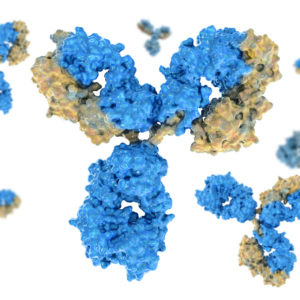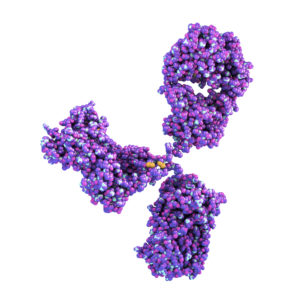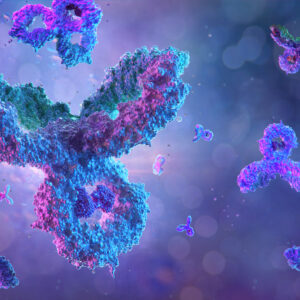GOAT ANTI-HELICOBACTER PYLORI ANTIBODY
Affinity purified antibody isolated from a pool of serum from goats immunized with Helicobacter pylori.
PRODUCT DETAILS – GOAT ANTI-HELICOBACTER PYLORI ANTIBODY
- Part of the BacTrace® range of antigens and antibodies.
- Affinity purified antibody made in goat.
- Isolated from a pool of serum from goats immunized with Helicobacter pylori.
- This product reacts specifically with Helicobacter pylori. It reacts with H. pylori 43504, 43526, and 43579 from ATCC. Antibody may also show some cross-reactivity to other Helicobacter species.
- Product is in lyophilized form.
- Each lot is tested to assure specificity and lot-to-lot consistency using an in-house ELISA assay.
BACKGROUND
Helicobacter pylori (H. pylori) is a spiral-shaped bacterium that infects 30-50% of the world’s population, making it one of the most common human bacterial infections. It invades the mucosal lining of the stomach and is the cause of up to 80% of duodenal and up to 60% gastric ulcers and has also been associated with gastric cancer and lymphoma. As such, the World Health Organization (WHO) has declared the bacteria to be a Class 1 carcinogen (Camilo et al., 2017).
The exact mode of transmission of H. pylori remains unclear. There is some evidence to suggest that it is transmitted from person to person via the faecal-oral route. Most H. pylori infections occur in childhood. Crowded living conditions, poor sanitation, poor personal hygiene and a poor water supply correlate with higher rates of infection (which can approach 80% of the population in the developing world). The majority of people with H. pylori are asymptomatic but symptoms of infection can include burning pain in the upper portion of the abdomen, indigestion, nausea, vomiting, burping, loss of appetite.
The patient’s blood may be screened for the presence of antibodies to pylori indicating an immune response to the bacteria as well as a stool antigen test (Wang et al., 2015).
REFERENCES
- Camilo V, Sugiyama T, Touati E. Pathogenesis of Helicobacter pylori infection. Helicobacter. 2017 Sep;22 Suppl 1. doi: 10.1111/hel.12405.
- Wang YK, Kuo FC, Liu CJ, Wu MC, Shih HY, Wang SS, Wu JY, Kuo CH, Huang YK, Wu DC. Diagnosis of Helicobacter pylori infection: Current options and developments. World J Gastroenterol. 2015 Oct 28;21(40):11221-35.



